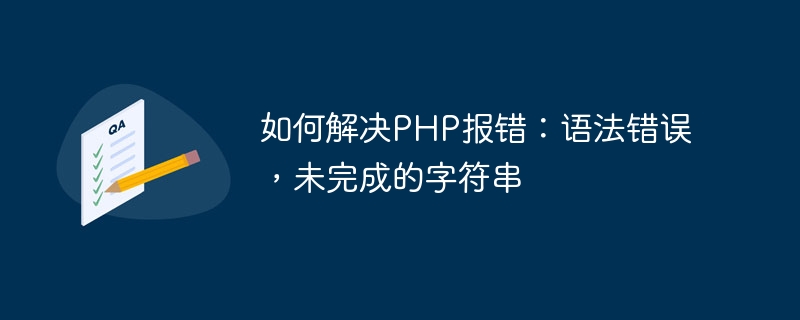

How to solve PHP error: syntax error, unfinished string
Introduction:
In the process of using PHP for coding development, syntax errors are common One of the problems you will encounter. One of the common syntax errors is the unfinished string error. This error usually occurs when a string in a line of code is not properly closed in quotes. This article will introduce how to solve PHP errors: syntax error, unfinished string, and provide some code examples to help readers better understand.
Example:
In the following example code, an unfinished string error occurs:
$name = "John; echo "Hello, $name!";
Solution:
The correct code should be:
$name = "John"; echo "Hello, $name!";
Example:
In the following example code, an unfinished string error occurs:
$name = 'John's'; echo "Hello, $name!";
Solution:
The correct code should be:
$name = 'John's'; echo "Hello, $name!";
Example:
In the following example code, an unfinished string error occurs:
$name = "John"; echo "Hello," + $name + "!";
Solution:
The correct code should be:
$name = "John"; echo "Hello," . $name . "!";
Example:
In the following example code, use Heredoc syntax to create a multi-line string:
$name = "John"; $message = <<<MESSAGE Hello, $name! MESSAGE; echo $message;
Solution:
Using Heredoc syntax can ensure that the string is correctly Closure, thus avoiding unfinished string errors.
Summary:
In the process of coding development using PHP, the unfinished string error is one of the common syntax errors. To resolve such errors, you need to carefully check the closing of quotes in your code, use escape characters to avoid confusion between quotes and characters, check the use of concatenation operators, and consider using Heredoc syntax to create multi-line strings. Through the above methods, I believe readers can better solve PHP error reports: syntax errors, unfinished string problems, and improve development efficiency and code quality.
The above is the detailed content of How to solve PHP error: syntax error, unfinished string. For more information, please follow other related articles on the PHP Chinese website!




